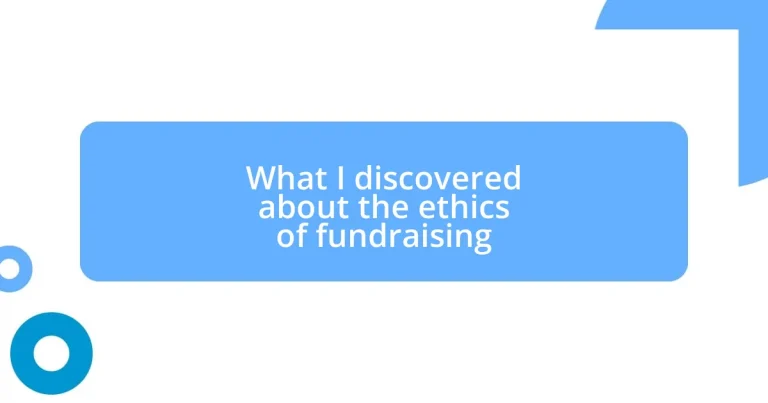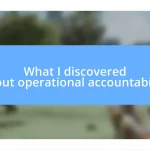Key takeaways:
- Fundraising ethics prioritizes transparency, integrity, and accountability to build trust and foster genuine connections with donors.
- Transparency directly influences donor retention and transforms the fundraising experience into a meaningful partnership rather than just a transaction.
- Common ethical dilemmas include donor manipulation, transparency in donor recognition, and the balance between emotional storytelling and integrity.
- Resources like the Association of Fundraising Professionals and relevant literature can guide fundraisers in adopting ethical practices and improving donor relations.
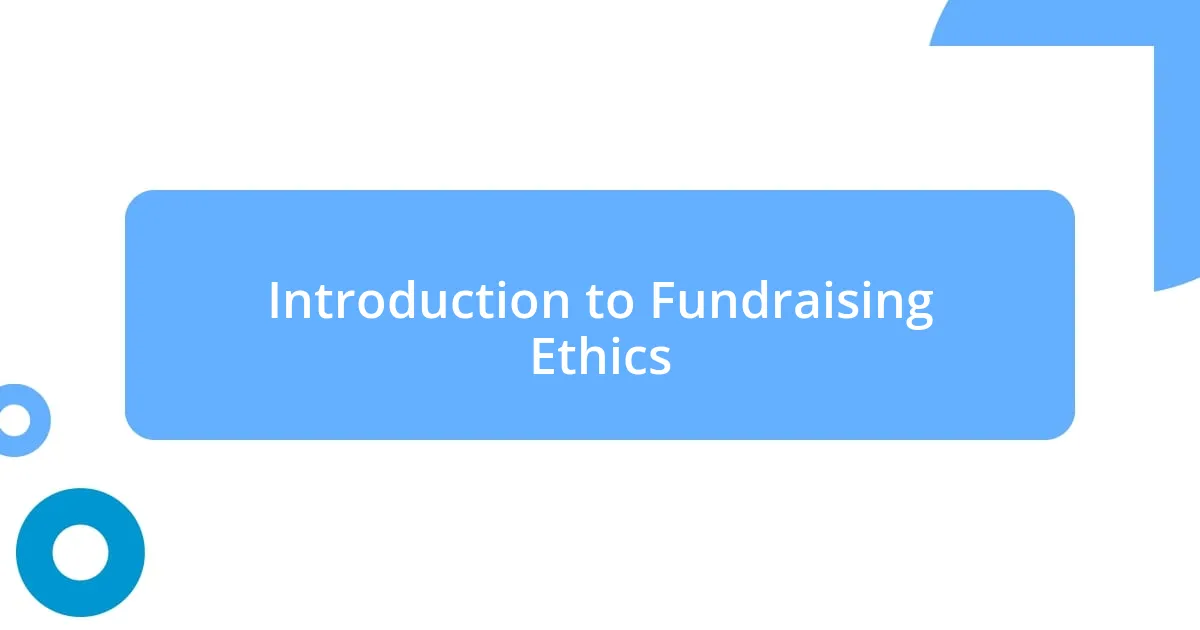
Introduction to Fundraising Ethics
Fundraising ethics is a fascinating and often complex subject that influences how organizations connect with their donors. I remember the first time I attended a fundraising event; I was both inspired and skeptical. It made me question, how transparent were the organizations about the use of the funds?
As I delved deeper into fundraising practices, I realized the ethical principles guiding donations are vital. It’s not just about raising money; it’s about building trust with supporters. I can’t help but wonder, if we don’t prioritize ethical standards, what does that say about our values as fundraisers?
I’ve seen firsthand how ethical dilemmas can arise, especially when pressure mounts to meet fundraising goals. The emotional weight of these decisions can be overwhelming. Should we compromise our integrity for a quick win, or should we stay true to our mission, even if it means slower progress? Ultimately, the choices we make reflect not only our organization’s identity but also the trust our community places in us.
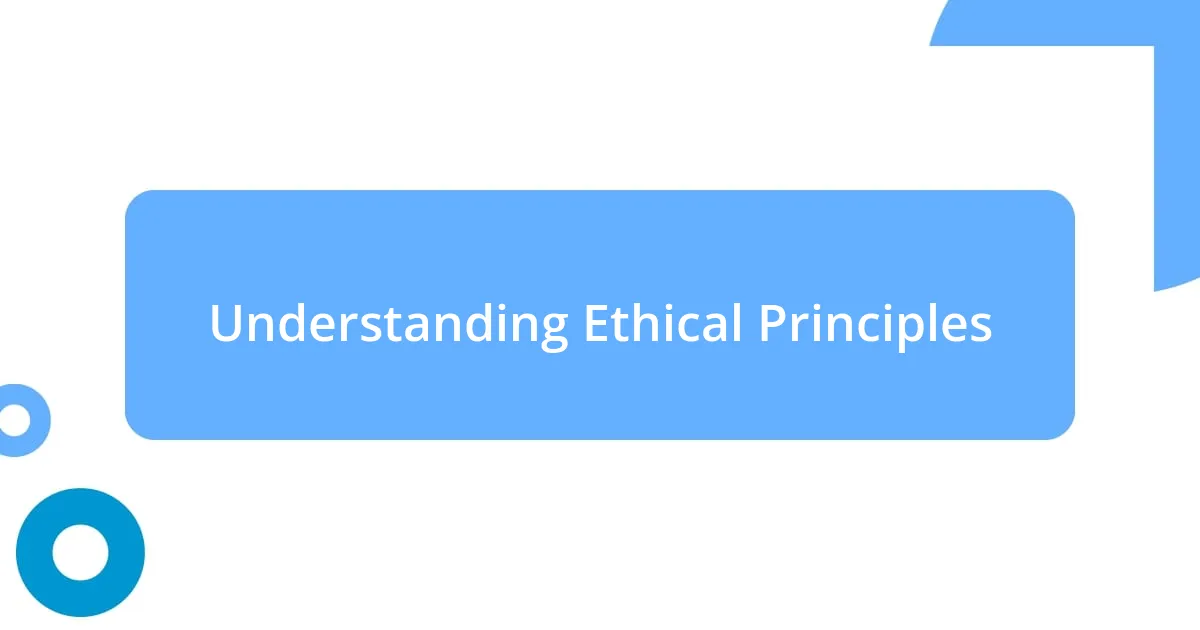
Understanding Ethical Principles
Understanding ethical principles in fundraising is crucial for several reasons. When I think back to one particular campaign I spearheaded, I observed that being transparent about how every dollar would be used fostered genuine connections with our donors. They appreciated knowing their contributions were going directly to our cause and not lining pockets or being lost in administrative fees. This openness is a pillar of ethical fundraising.
Key ethical principles to consider include:
- Transparency: Clearly communicate how funds will be used.
- Integrity: Maintain honesty in all interactions and campaigns.
- Accountability: Be responsible for the commitments made to donors.
- Respect for Donors: Honor the wishes and intentions behind their contributions.
- Fairness: Ensure that all fundraising efforts are equitable and non-exploitative.
As I reflect on various fundraising initiatives, it’s essential to create an environment where donors feel their values align with our mission. When we truly honor these principles, it’s not just about the money; it’s about the meaningful relationships built within our community.
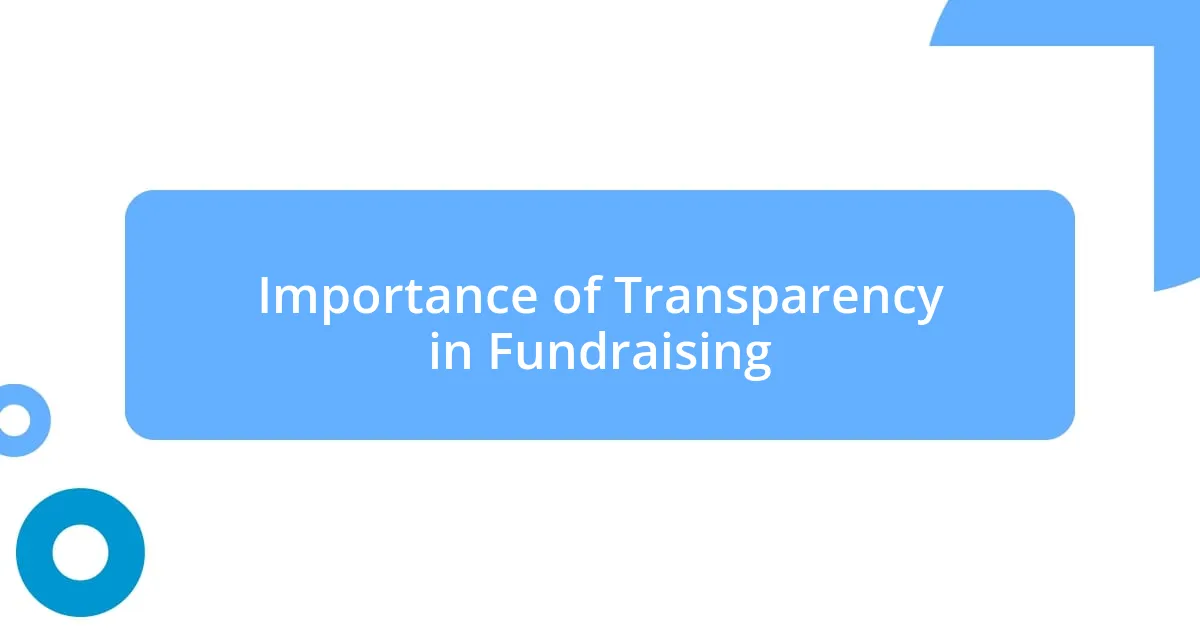
Importance of Transparency in Fundraising
Maintaining transparency in fundraising is essential to building lasting relationships with donors. I recall a particular event where we had a detailed breakdown of how contributions would be allocated. By sharing this information openly, I saw our donors respond with enthusiasm and increased trust. They were not merely giving; they felt like partners in our mission, which created a deeper emotional investment.
It’s interesting to note how transparency can directly affect donor retention. In one campaign I led, the more we communicated about our financials and project outcomes, the more supporters felt connected and committed. It reminded me that when donors understand the impact of their contributions, they are much more likely to renew their support. In many ways, transparency transforms the donor experience from a one-time transaction into a meaningful journey.
Moreover, transparency isn’t just a nice-to-have; it’s a critical issue of ethical responsibility. I’ve encountered organizations that stumbled when they failed to disclose where funds were going, leading to distrust and backlash. This experience taught me a valuable lesson: when we openly share our fundraising goals and methods, we empower our supporters to advocate for our cause confidently.
| Transparent Practices | Consequences of Opacity |
|---|---|
| Enhanced donor trust through clear communication | Loss of donor confidence and support |
| Stronger donor relationships leading to higher retention | Increased scrutiny and negative publicity |
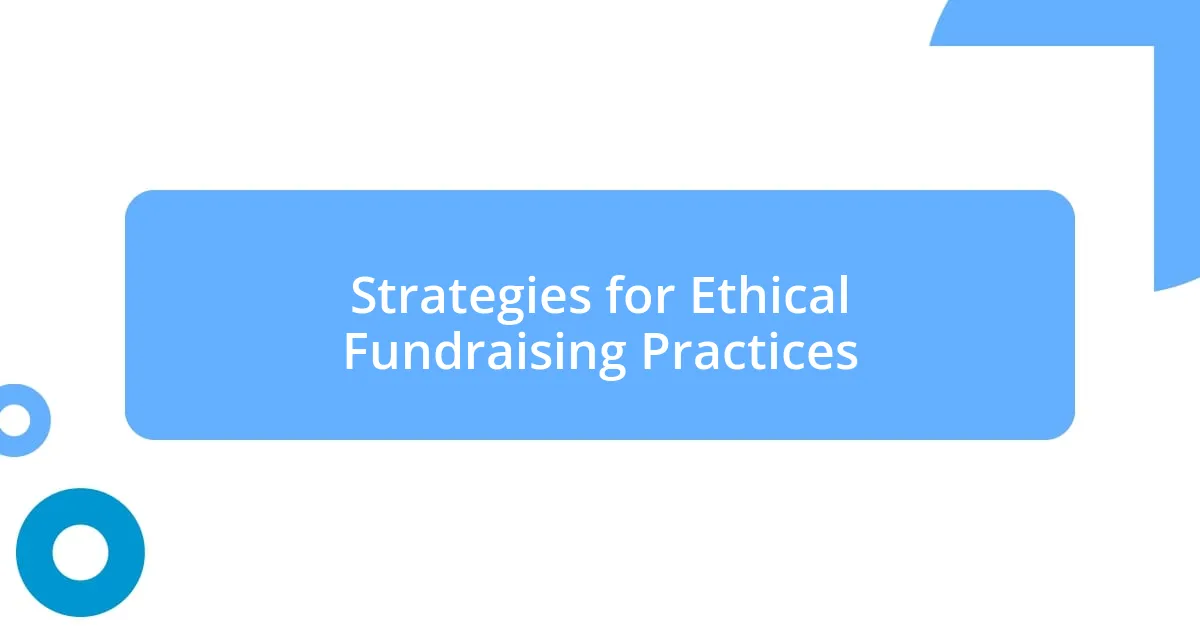
Strategies for Ethical Fundraising Practices
When I think about ethical fundraising practices, one strategy that stands out is prioritizing donor education. During a campaign I managed, we took the time to educate our donors on the specific challenges our organization faced. I remember how one donor expressed gratitude for the insight; they said it made their support feel more meaningful. This experience reinforced my belief that informed donors are more likely to remain engaged and passionate about the mission.
Another key strategy is to actively seek feedback from donors, creating a loop of communication. There was a time when I implemented a survey after a major fundraising event, asking donors what they valued most in our approach. The responses not only helped us refine our strategies but also fostered a sense of ownership among our supporters. Imagine how powerful it is for donors to know their voices truly matter in shaping the organization’s direction—it’s a game changer for building lasting relationships.
Accountability also plays a vital role in ethical fundraising. I once partnered with a foundation that not only required regular financial updates but also expected us to showcase our impact in the community. This level of scrutiny pushed us to be more responsible and transparent, ultimately making our fundraising efforts stronger. Have you ever felt the pressure to deliver results? For me, it was a catalyst for growth, demonstrating that true ethical fundraising isn’t just about receiving funds but about honoring our commitments to those who believe in our cause.
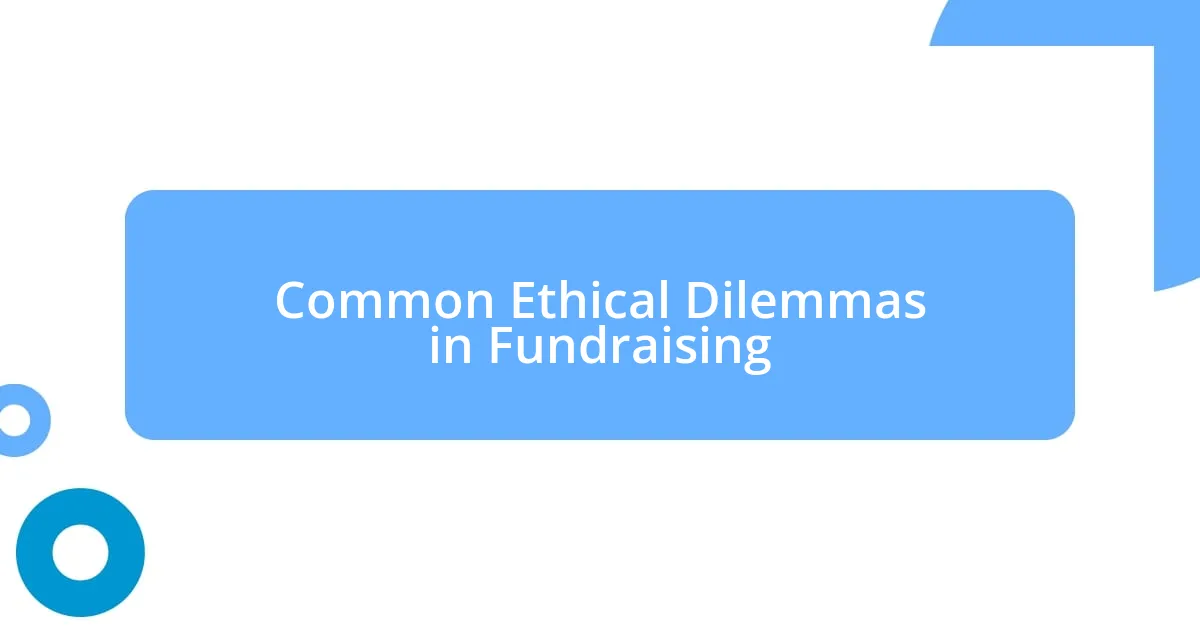
Common Ethical Dilemmas in Fundraising
I often think about the ethical dilemmas that arise in fundraising, particularly when it comes to donor manipulation. I remember a situation where we were under immense pressure to meet a fundraising goal, and someone suggested exaggerating the urgency of a need to encourage donations. I felt uncomfortable—it was a slippery slope that risked our integrity. Have you ever faced a similar situation? It’s a tough call when you know the cause is worthy, but I believe honesty should always come first.
Another common dilemma relates to transparency around donor recognition. There was a time when we were considering naming opportunities for major gifts. While it’s certainly a great way to honor significant contributions, I became wary of the implications. Would it create a tiered donor society where smaller contributions felt devalued? From my perspective, it’s crucial to ensure that every donor feels appreciated, regardless of their giving level.
Then, there’s the fine line between persuasion and manipulation. I clearly remember a campaign where we used emotional storytelling to convey our mission. While the heart-wrenching stories drew in donations, I wondered: were we crossing ethical boundaries by tugging at heartstrings too fiercely? Authentic storytelling can inspire action, but it’s essential to balance emotional engagement with integrity. I’ve learned that ethical fundraising is about respecting the donor’s intelligence and fostering genuine connections instead of merely soliciting gifts.
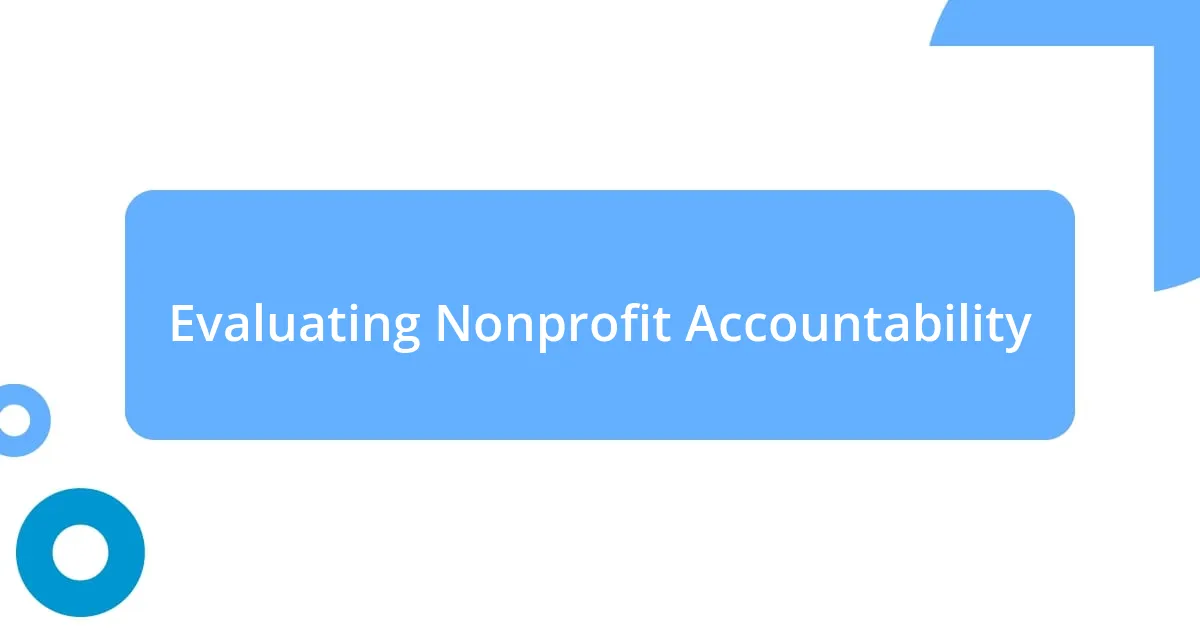
Evaluating Nonprofit Accountability
When evaluating nonprofit accountability, I’ve found that clear communication of outcomes is paramount. There was an instance where our team dedicated a full report to the impact of our latest project. Not only did it highlight the tangible differences we made, but it also built trust with our donors. Imagine opening an email that outlines how your contributions have directly improved lives—wouldn’t that keep you invested in the cause?
I’ve also come to appreciate the role of independent audits in fostering accountability. Once, our organization underwent a surprise audit, and I was initially anxious about the results. However, it turned into a transformative experience, revealing areas for improvement we hadn’t noticed before. This process not only strengthened our operations but also reassured our donors that we take financial stewardship seriously. How often do you think organizations truly embrace this level of scrutiny?
In my experience, accountability should also include sharing challenges openly with supporters. I remember a campaign where we faced unexpected hurdles, and instead of hiding our struggles, we chose to share them. The response was overwhelmingly positive; donors appreciated our honesty and were even more supportive. It’s a delicate balancing act, but I truly believe that showing vulnerability can deepen the connection between a nonprofit and its community. What are your thoughts on this? For me, it’s a refreshing reminder that accountability isn’t just about numbers; it’s about fostering genuine relationships.
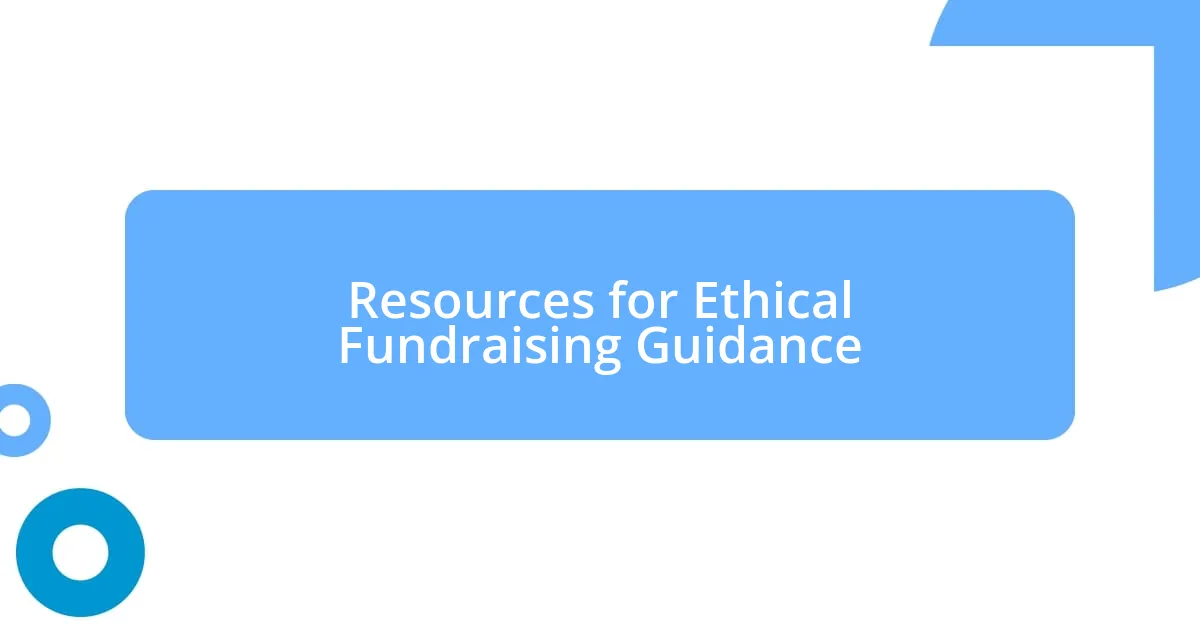
Resources for Ethical Fundraising Guidance
One resource I’ve found incredibly helpful for ethical fundraising guidance is the Association of Fundraising Professionals (AFP). They offer a wealth of training materials and ethical frameworks that have shaped my understanding and practices over the years. I remember attending one of their conferences where they emphasized the importance of donor rights. It struck me that treating donors with respect and transparency isn’t just ethical; it’s a strategic approach that fosters loyalty.
I also swear by “The Fundraising Reality Check” by Jennifer McCrea. This book opened my eyes to the psychology behind giving and how crucial it is to align fundraising with a sense of purpose. The anecdotes in the book really resonated with me—especially the one about a small nonprofit that turned their whole approach around by involving donors in decision-making processes. This made me question my own practices: am I truly valuing donor input, or am I just treating them as transactional sources of income?
Lastly, I can’t stress enough the value of engaging in peer-to-peer discussions with fellow fundraisers. I’ve had countless enlightening conversations over coffee with colleagues who share their ethical dilemmas. These candid exchanges not only offer fresh perspectives but often lead to personal revelations about my approach. Have you ever had a conversation that completely changed how you view a certain aspect of your work? Trust me, it’s enlightening to see how others navigate ethical fundraising!












